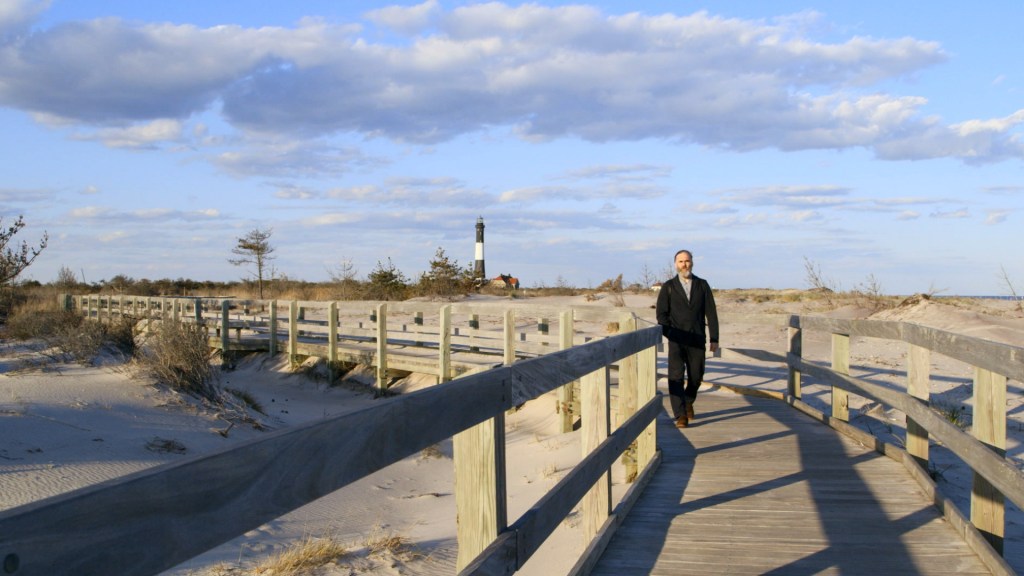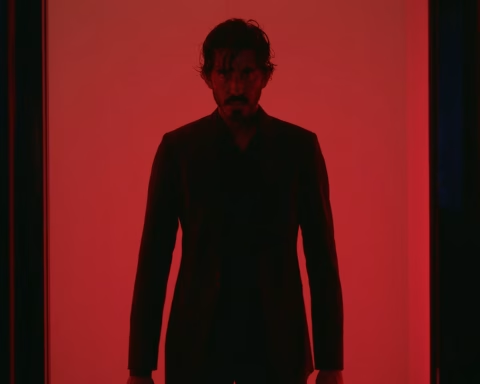David Nicholas Williamson is being honoured with the Stirling Achievement Award at this year’s Central Scotland Documentary Festival. The festival is screening his 2015 documentary The First Film (2015) as part of this year’s offerings of new, and older films.

If you’re a student of film, you’ll have almost certainly studied a module on the early history of film. You’ll have been taught that moving images were first captured by either Edison, or the Lumiere brothers.
You’ll probably have been told about the Magic Lantern slide shows, and Eadweard Muybridge using high-speed stop-motion photographs to capture the motion of a racehorse.
You’ve probably not been told about Leeds-resident Frenchman Louis Le Prince.
Louis Le Prince’s influence on The First Film
Le Prince had a fascinating life. It included possibly using a camera to capture moving images for the first time anywhere in the world, on October 14 1888, some seven years before his fellow French inventors were credited with that feat.
But most fascinating, and probably the reason for his exclusion from film history, is that on September 16 1890, Le Prince boarded a train at Dijon, headed towards Paris, but never arrived. He was never seen again. No body has ever been found. And as we learn during Williamson’s film, it took two months for him to be reported as missing.
This is a fantastic and bizarre story. In this documentary, Williamson takes us through the culmination of his own three decade long quest to uncover the truth about Le Prince and his supposed achievements.

The storytelling within this film is exceptional – visually, Leeds has rarely looked so stunning. Within the compelling narrative, Williamson cleverly weaves the three strands of the story he has chosen to relate. These are: the story of Leeds; of early film, and; of Louis Le Prince.
It becomes clear that Williamson is as obsessed with Le Prince as Le Prince was with exploring the possibilities of film.
The ‘issue’ of whether Le Prince did achieve this “first” is solved early on when we’re shown the fragments of flickering frames created by Le Prince. Which, in a move of outstanding foresight, were passed to a museum in Leeds in the early 1930s to be preserved and held in safe keeping.
There are maybe three seconds worth of a scene remaining. However, watching it loop, you are drawn in, and begin to ask the same questions Williamson does about the who, what, where, when and how.
Who was “first”?
The argument against Le Prince was that his ‘film’ pre-dates celluloid film stock. Instead, his was made on either glass plates or on paper film reels. Opposers say Le Prince’s work is closer to stop-motion photography, or the Zeotropes of the 1830s, than it is to the true films of the 1890s.

In the end, it may not matter. The thirst to be able to definitively say who was ‘first’ is plainly an obsession of Williamson’s. The ‘invention’ of film was the culmination of the efforts and technical problem solving of a number of inventors, spread over decades.
The reason why the Lumieres got the credit in Europe can be attributed to their understanding of the need to generate an audience for the footage they were shooting – and their ability to do just that. In America, it’s probably to the surprise of no-one looking back on history that Edison has taken the credit.
Le Prince took an important step in making any scene shot on film a success. He combined the artistic and technical skills needed to do so.
To have excluded the work he did, overlooks his contribution. It suggests that the moments widely accepted as ‘the first film’ appear to have been conjured from the minds of geniuses. Instead, it emerged from tinkering, making tiny improvements to the discoveries made, and patented, by others.
If we can accept the evolutionary story of film emerges from still photography, culminating to that moment of workers leaving a factory, and a train arriving at a station, then we can accept that the steps to get to that point are just as worthy of consideration. And this remains the case even if the person who undertook that work was working in a provincial city, without a network of fellow film experimenters, and with limited financial resources.

Review
Williamson has been producing documentary films for over 30 years, but The First Film was his first time directing. He also wrote the script, produced the film, and appears on screen as our guide through the story.
The Q&A after this screening revealed that, like Grierson, who is also celebrated this weekend, Williamson appears to have a focus on relating the stories of those who are otherwise overlooked.
The purpose of a good documentary is to give us a glimpse into a life, or a section of society that we do not usually see, or who are not included in the national discussion. The purpose of a good story is to leave you wanting more – to want to know what happened next.
The First Film cannot answer what happened to Louis Le Prince, or what would have happened to him had he not disappeared without a trace. However The First Film does succeed, both as a compelling and fascinating documentary of an excluded and largely forgotten pioneer, and also as an example of entertaining and intriguing storytelling, that leaves us wanting more.
The First Film is available to watch on Amazon Freevee, or to buy via Prime Video.
Featured Image Credit: Central Scotland Documentary Festival




